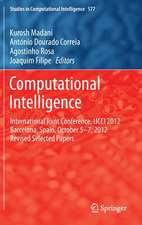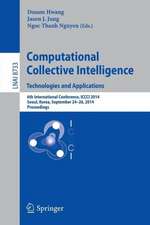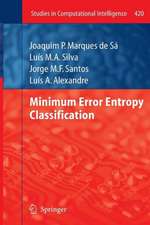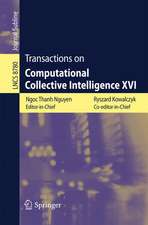Advances in Artificial Intelligence: 13th Brazilian Symposium on Artificial Intelligence, SBIA'96 Curitiba, Brazil, October 23 - 25, 1996; Proceedings: Lecture Notes in Computer Science, cartea 1159
Editat de Dibio L. Borges, Celso A.A. Kaestneren Limba Engleză Paperback – 9 oct 1996
The 21 revised full papers presented were carefully selected from a total of 66 submissions; also included are one-page abstracts of invited talks and poster presentations. Besides a strong Brazilian component, the majority of contributing authors are well-known researchers from abroad. The papers are organized in topical sections on nonmonotonic reasoning, planning, learning and heuristic search, distributed AI and multi-agent systems, genetic algorithms, natural language processing, vision and AI applications, and logic programming.
Din seria Lecture Notes in Computer Science
- 20%
 Preț: 1061.55 lei
Preț: 1061.55 lei - 20%
 Preț: 341.95 lei
Preț: 341.95 lei - 20%
 Preț: 369.12 lei
Preț: 369.12 lei - 20%
 Preț: 645.28 lei
Preț: 645.28 lei - 20%
 Preț: 591.51 lei
Preț: 591.51 lei - 15%
 Preț: 580.46 lei
Preț: 580.46 lei -
 Preț: 410.88 lei
Preț: 410.88 lei - 20%
 Preț: 504.57 lei
Preț: 504.57 lei -
 Preț: 381.21 lei
Preț: 381.21 lei - 20%
 Preț: 340.32 lei
Preț: 340.32 lei - 20%
 Preț: 1414.79 lei
Preț: 1414.79 lei - 20%
 Preț: 538.29 lei
Preț: 538.29 lei - 20%
 Preț: 583.40 lei
Preț: 583.40 lei - 20%
 Preț: 1075.26 lei
Preț: 1075.26 lei - 20%
 Preț: 238.01 lei
Preț: 238.01 lei - 17%
 Preț: 360.19 lei
Preț: 360.19 lei - 20%
 Preț: 438.69 lei
Preț: 438.69 lei - 20%
 Preț: 1183.14 lei
Preț: 1183.14 lei - 20%
 Preț: 596.46 lei
Preț: 596.46 lei - 15%
 Preț: 438.59 lei
Preț: 438.59 lei - 20%
 Preț: 655.02 lei
Preț: 655.02 lei - 20%
 Preț: 649.49 lei
Preț: 649.49 lei - 20%
 Preț: 309.90 lei
Preț: 309.90 lei - 20%
 Preț: 337.00 lei
Preț: 337.00 lei -
 Preț: 449.57 lei
Preț: 449.57 lei - 20%
 Preț: 310.26 lei
Preț: 310.26 lei - 20%
 Preț: 1024.44 lei
Preț: 1024.44 lei - 20%
 Preț: 579.30 lei
Preț: 579.30 lei - 20%
 Preț: 763.23 lei
Preț: 763.23 lei - 20%
 Preț: 453.32 lei
Preț: 453.32 lei - 20%
 Preț: 575.48 lei
Preț: 575.48 lei - 20%
 Preț: 585.88 lei
Preț: 585.88 lei - 20%
 Preț: 326.98 lei
Preț: 326.98 lei - 20%
 Preț: 825.93 lei
Preț: 825.93 lei - 17%
 Preț: 427.22 lei
Preț: 427.22 lei - 20%
 Preț: 763.23 lei
Preț: 763.23 lei - 20%
 Preț: 350.21 lei
Preț: 350.21 lei - 20%
 Preț: 307.71 lei
Preț: 307.71 lei - 20%
 Preț: 580.93 lei
Preț: 580.93 lei - 20%
 Preț: 340.32 lei
Preț: 340.32 lei - 20%
 Preț: 343.62 lei
Preț: 343.62 lei - 20%
 Preț: 583.40 lei
Preț: 583.40 lei - 20%
 Preț: 583.40 lei
Preț: 583.40 lei -
 Preț: 389.48 lei
Preț: 389.48 lei - 20%
 Preț: 353.50 lei
Preț: 353.50 lei - 20%
 Preț: 607.39 lei
Preț: 607.39 lei
Preț: 330.75 lei
Preț vechi: 413.44 lei
-20% Nou
Puncte Express: 496
Preț estimativ în valută:
63.30€ • 65.83$ • 52.97£
63.30€ • 65.83$ • 52.97£
Carte tipărită la comandă
Livrare economică 14-28 martie
Preluare comenzi: 021 569.72.76
Specificații
ISBN-13: 9783540618591
ISBN-10: 3540618597
Pagini: 264
Ilustrații: XII, 248 p.
Dimensiuni: 216 x 279 x 14 mm
Greutate: 0.37 kg
Ediția:1996
Editura: Springer Berlin, Heidelberg
Colecția Springer
Seriile Lecture Notes in Computer Science, Lecture Notes in Artificial Intelligence
Locul publicării:Berlin, Heidelberg, Germany
ISBN-10: 3540618597
Pagini: 264
Ilustrații: XII, 248 p.
Dimensiuni: 216 x 279 x 14 mm
Greutate: 0.37 kg
Ediția:1996
Editura: Springer Berlin, Heidelberg
Colecția Springer
Seriile Lecture Notes in Computer Science, Lecture Notes in Artificial Intelligence
Locul publicării:Berlin, Heidelberg, Germany
Public țintă
ResearchCuprins
An argumentation based framework for defeasible and qualitative reasoning.- Well-behaved IDL theories.- Epistemic conditional logics.- A Hybrid Formal Theory of plan recognition and its implementation.- Algorithms ? for ?-standard state graphs: Results about termination and admissibility.- Regression by classification.- A generic model of cognitive agent to develop open systems.- Coordination among individually-motivated agents: An evolutionary approach.- Adaptive Hierarchical Censored Production Rule-based system: A genetic algorithm approach.- Finding optimal representations using the crossover correlation coefficient.- An evolutionary algorithm for resource-constrained project scheduling and multiple execution modes.- Evaluating the robustness and scalability of revision-based natural language generation.- Semi-automatic anaphora resolution in portable natural language interfaces.- A discourse model for gist preservation.- Iterative curve organisation with the EM algorithm.- Model-Based pose proposal for 2-D object recognition.- TARCA — An integrated system for diagnosis and treatment of cardiac arrhythmias.- Intelligent Distributed Environmental Decision Support System.- Object-oriented algorithm for combining dichotomic belief functions.- Automatic bottom-up analysis and transformation of logic programs.- A temporal extension to the Parsimonious Covering Theory.- Biological inspirations in neural network implementations of Autonomous Agents.- Intelligent Tutoring Systems modelled through the mental states.- Fundamentals of fuzzy logic and its hardware implementation.- Status & challenges for coordination technology: An AI perspective.- Combining natural language understanding and information retrieval for flexible hypertext navigation.- Numerical models forthe treatment of imperfect information in knowledge-based systems.- Intelligent Tutoring Systems: Functional approach x agents approach.- The case-based reasoning paradigm: perspective, technology and impacts.- Qualitative models for interactive articulated learning environments.- H-computation.- Is computer vision still AI?.- Fuzzy robotics and fuzzy image understanding.- Toward a theory of molecular computing.
















